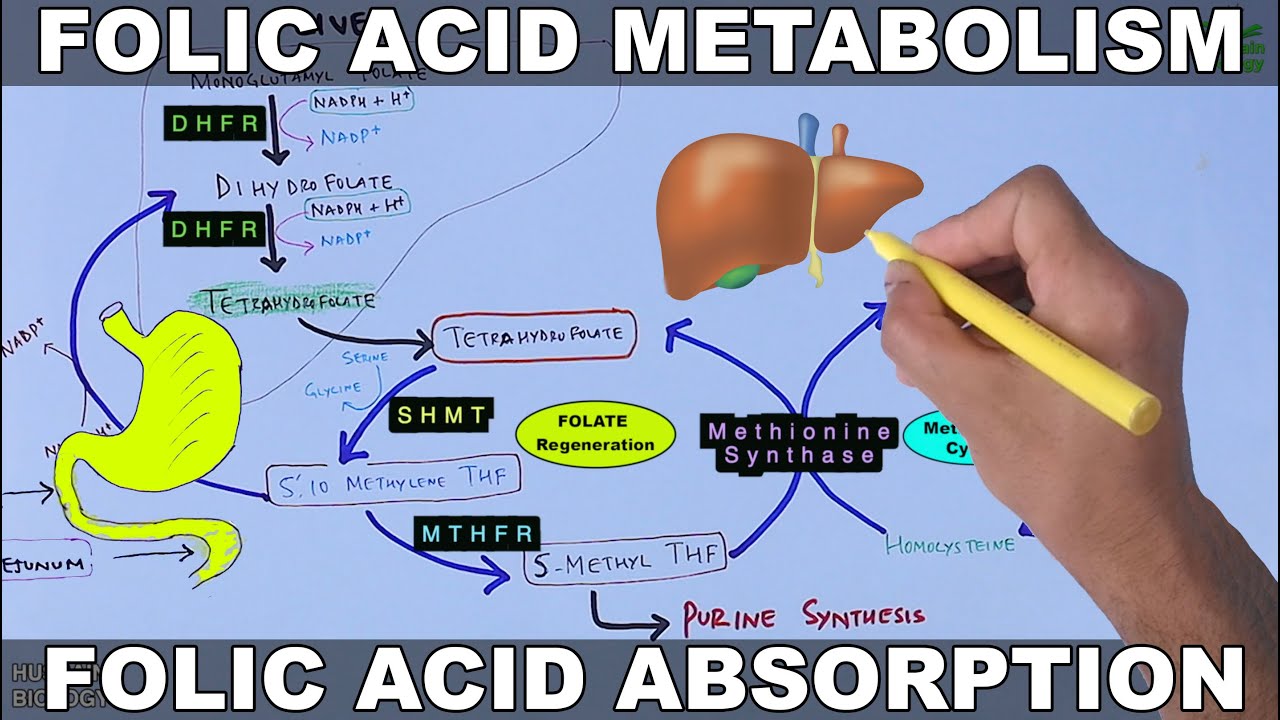Purine Metabolism (De Novo, Salvage, Degradation, Uric Acid)
Summary
TLDRIn this video, Medicos explains purine metabolism, covering three key processes: de novo purine synthesis, purine degradation, and purine salvage. The discussion begins with the structure of DNA and RNA, highlighting the differences between purines and pyrimidines. It moves on to explore the pathways involved in building, breaking down, and recycling purines, with references to key enzymes and drugs that influence these processes. The video also touches on the medical implications, such as gout and its treatment, and includes a review of important pharmacological agents like methotrexate, sulfonamides, and allopurinol, explaining their roles in managing related conditions.
Takeaways
- 😀 Purine metabolism involves three main processes: de novo purine synthesis, purine degradation, and purine salvage.
- 😀 DNA is made up of deoxyribose sugar, nitrogenous bases (adenine, guanine, thymine, cytosine), and phosphate groups, with purines consisting of adenine and guanine.
- 😀 Purines are synthesized through the de novo pathway, starting with ribose 5-phosphate, which is converted into IMP, then into AMP and GMP.
- 😀 Purine degradation leads to the breakdown of IMP into inosine, hypoxanthine, xanthine, and ultimately uric acid, which is excreted in the urine.
- 😀 The process of purine salvage recycles purines by converting adenosine and guanine back into AMP and GMP, preventing waste and reusing these molecules.
- 😀 Sulfonamides like sulfamethoxazole block folate synthesis in bacteria, inhibiting DNA and RNA production, which is critical for bacterial growth.
- 😀 Trimethoprim and methotrexate inhibit dihydrofolate reductase, disrupting purine synthesis and leading to potential folate deficiency and megaloblastic anemia.
- 😀 Deficiency of adenosine deaminase causes severe combined immunodeficiency (SCID), while deficiency of HGPRT leads to Lesch-Nyhan syndrome, affecting purine salvage.
- 😀 In the context of gout, high-dose aspirin helps by promoting uric acid excretion in urine, whereas low-dose aspirin inhibits uric acid excretion.
- 😀 Medications like allopurinol and febuxostat inhibit xanthine oxidase, reducing uric acid production and providing therapeutic benefits in gout management.
Q & A
What are the basic components of DNA as described in the transcript?
-DNA consists of deoxyribose sugar, nitrogenous bases (adenine, guanine, thymine, cytosine), and phosphate. The purines are adenine and guanine, while the pyrimidines are thymine and cytosine.
What is the difference between purines and pyrimidines in terms of their structure?
-Purines have a double-ring structure (adenine and guanine), whereas pyrimidines have a single-ring structure (thymine and cytosine).
What are the three key processes in purine metabolism discussed in the script?
-The three key processes in purine metabolism are: 1) De novo purine synthesis, 2) Purine degradation, and 3) Purine salvage (recycling).
What is the purpose of the enzyme dihydrofolate reductase in purine metabolism?
-Dihydrofolate reductase helps convert dihydrofolate (DHF) into tetrahydrofolate (THF), which is essential for the synthesis of purines and pyrimidines in DNA and RNA.
How does sulfonamide (like sulfamethoxazole) affect purine metabolism?
-Sulfonamides inhibit the enzyme dihydropteroate synthase in bacteria, preventing the synthesis of folic acid. This disrupts the bacterial ability to produce DNA and RNA, thereby acting as an antibiotic.
What is the role of methotrexate in purine metabolism, and what is its primary side effect?
-Methotrexate inhibits dihydrofolate reductase, disrupting folate metabolism and purine synthesis, particularly in rapidly dividing cells. A common side effect is folate deficiency, which can lead to megaloblastic anemia.
What is the de novo purine synthesis pathway starting from ribose 5-phosphate?
-The de novo purine synthesis pathway starts with ribose 5-phosphate, which is converted into PRPP (phosphoribosyl pyrophosphate). PRPP then leads to the formation of inosine monophosphate (IMP), which is further converted into AMP (adenosine monophosphate) and GMP (guanosine monophosphate).
How are purines degraded and what enzyme is involved in their breakdown?
-Purines are degraded by the enzyme xanthine oxidase, which converts inosine monophosphate (IMP) to inosine, and then to hypoxanthine, xanthine, and ultimately uric acid. Uric acid is excreted in the urine.
What is purine salvage and which enzymes are involved in this process?
-Purine salvage is the recycling of purines instead of degrading them. The enzymes involved are adenosine phosphoribosyltransferase (APRT) for adenosine to AMP, and hypoxanthine-guanine phosphoribosyltransferase (HGPRT) for hypoxanthine and guanine to IMP and GMP, respectively.
How do drugs like allopurinol and febuxostat help manage gout?
-Allopurinol and febuxostat inhibit the enzyme xanthine oxidase, reducing the production of uric acid from purine degradation. This helps lower serum uric acid levels and prevents gout flare-ups.
Why is it important to understand the role of aspirin in gout management, and what is the difference between low-dose and high-dose aspirin?
-In gout management, high-dose aspirin promotes uric acid excretion in the urine and lowers serum uric acid levels, thus helping reduce gout symptoms. Low-dose aspirin, however, is used for anti-platelet effects and heart protection, and it does not have the same effect on gout.
What is Lesch-Nyhan syndrome and how is it related to purine metabolism?
-Lesch-Nyhan syndrome is a genetic disorder caused by a deficiency of the enzyme hypoxanthine-guanine phosphoribosyltransferase (HGPRT). This leads to an inability to salvage purines, resulting in excessive purine degradation and elevated levels of uric acid, which causes gout and neurological symptoms.
Outlines

This section is available to paid users only. Please upgrade to access this part.
Upgrade NowMindmap

This section is available to paid users only. Please upgrade to access this part.
Upgrade NowKeywords

This section is available to paid users only. Please upgrade to access this part.
Upgrade NowHighlights

This section is available to paid users only. Please upgrade to access this part.
Upgrade NowTranscripts

This section is available to paid users only. Please upgrade to access this part.
Upgrade Now5.0 / 5 (0 votes)





